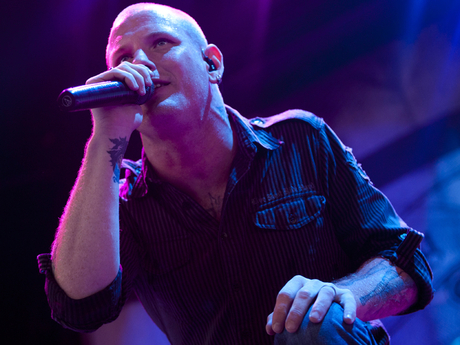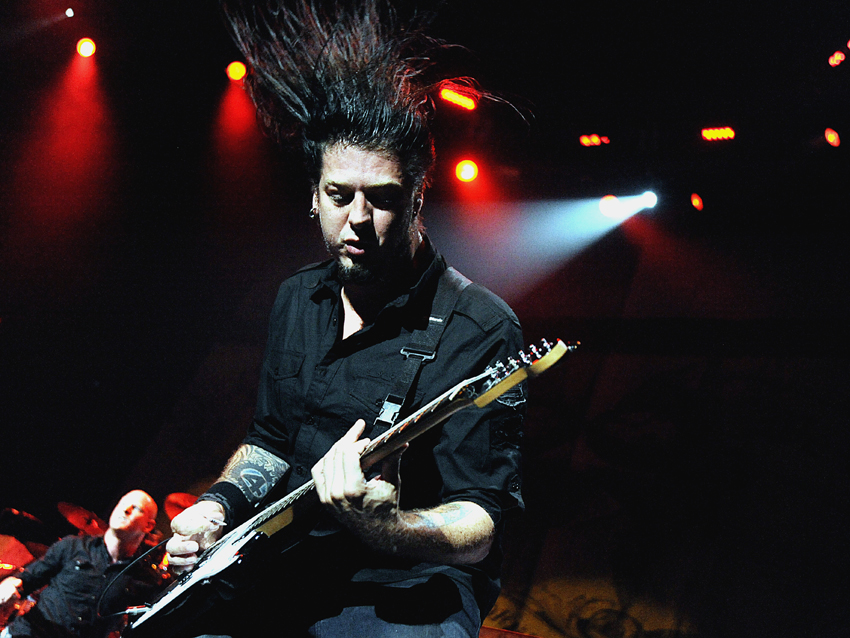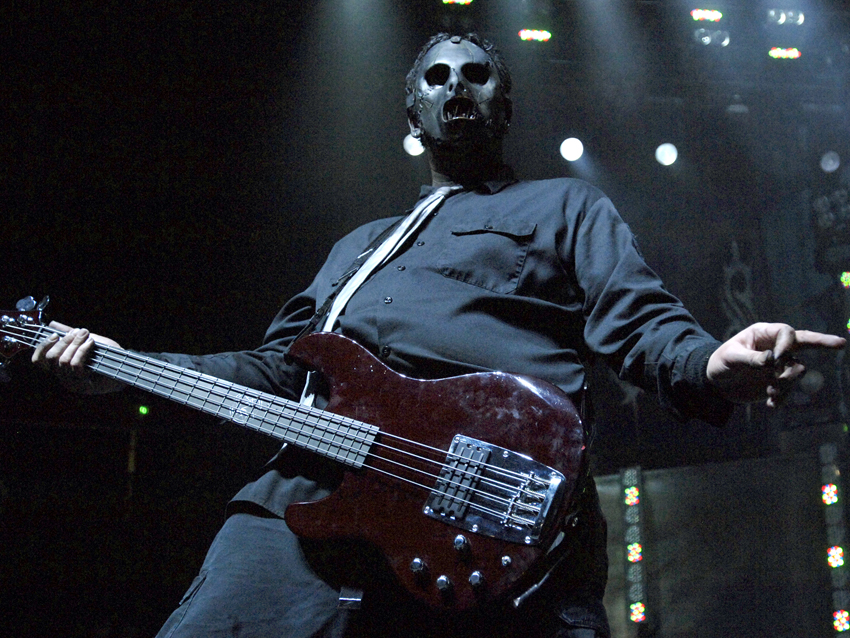
Want all the hottest music and gear news, reviews, deals, features and more, direct to your inbox? Sign up here.
You are now subscribed
Your newsletter sign-up was successful

Corey Taylor singing with Stone Sour at the First Midwest Bank Amphitheatre, Chicago, Illinois on 21 August 2010. © Â Chris Schwegler ./Retna Ltd./Corbis
"I'm a very lucky guy," says Corey Taylor, known to millions as #8, Slipknot's freakishly masked frontman, and to a lesser extent (although that could change soon) the downright normal-looking, unmasked singer and main songwriter for Stone Sour. "I get to write music that I love, and lo and behold, people seem to really like it. I know how fortunate I am."
Along with fellow Slipknoter, guitarist Jim Root, Taylor and the rest of Stone Sour (guitarist Josh Rand, bassist Shawn Economaki and drummer Roy Mayorga) have just released their third and most accessible album yet, the Nick Raskulinecz-produced Audio Secrecy.
In stark contrast to the doomsday-ish horror metal of Slipknot, Audio Secrecy is a line drive aimed squarely at rock's mainstream. Full of mature, melodious and deeply personal songs that bury themselves in the thicket of your senses on first listen, it's already attracting fans who wouldn't know The Subliminal Verses from a hole in the ground.
Which, according to Taylor, is pretty much the idea. "A lot of people are mighty stoked about this record," he says, "and I'm over-the-moon excited about that. There's this feeling going around that we could break big to a whole new level.
"I'm already noticing that there's no age limit to the kinds of people who like this record. We've got some Slipknot fans, but we're getting a whole bunch of other people. It's a little scary, but it's also damn gratifying. After all, it's been a rough few years."
Taylor admits that he's still reeling from the death last May of Paul Gray, Slipknot's founding bassist. "It's like, there are no words," he says. "Losing Paul isn't something you just get over. I don't know if we ever will. He was very important to all of us." And with a recent divorce and re-marriage, Taylor says he's had enough emotional upheaval of late to fill "five more records. But, you know, that's what an artist does - you write about what's going on inside. More and more, I find that I can do that in a very therapeutic way."
Want all the hottest music and gear news, reviews, deals, features and more, direct to your inbox? Sign up here.
In the following interview with MusicRadar, Corey Taylor discusses the writing and recording of Stone Sour's Audio Secrecy. He also talks about the current state of Slipknot and what the future holds for the Iowa-based superstars.
What would you say have been the differences between cutting Audio Secrecy and Stone Sour's last album, [2006's] Come What(ever) May?
"Forgetting all the personal stuff, no major changes. You know, some of us have been doing this band since before Slipknot, so we know each other real well, and we've grown up a lot. Nobody gets bent out of shape if there's constructive criticism or suggestions. We're all in this to make the best music possible.
"I think the biggest change has been the stuff that Roy has brought in. He wrote some fantastic material, extremely melodic yet very rhythmic. This is the first time he's been able to write for a band that he's been in, and man, his songs fit like a glove with everything else we've written. He's a supreme talent, and this record is going to show the world that."
Aside from the fact that there's less people involved, what's different about working with Slipknot versus a smaller outfit such as Stone Sour?
"Things just feel easier with Stone Sour. We're a real tight group, we get along real well, and we're such fans of each other's writing. We get real excited when somebody brings music in. As you can imagine, when there's not as many people in the mix, it's a lot easier to add things to the music, to bend the songs and shape them a bit and take them to higher places. Working with Slipknot…things are always kind of in place."

Jim Root on stage with Stone Sour at the Target Center in Minneapolis, Minnesota, 17 August 2010. © Gene Ambo ./Retna Ltd./Corbis
Explain to me how things are "kind of in place" with Slipknot. I would think that with so many members in that band there would be a lot of people contributing ideas - perhaps too many.
"With that many people, you kind of know that there's going to be a lot of different layers to the music. You know that Craig is going to add something. You know that Clown, Fehn, everybody's going to contribute and build up the layers. So yes, it can sometimes be this avalanche of ideas, and to some extent, you know what you might get and how a song might turn out.
"With Stone Sour, I find myself surprised more often than not. We start with the meat of the song, then we add elements very painstakingly, and we only put in what needs to be there. It's a thrilling process. Songs can start in a live sense and be what they are, but by the time we've recorded them they've grown so much. The evolution of songs from point A to point Z is something else. The stuff on this record, a lot of it feels pretty epic to me, like classic songs from a lot of different periods in rock."
I notice a huge growth in your singing on this album. Did you put a lot more thought and effort into your vocals than before?
"Oh, definitely. I wanted to outdo myself on every level, and I think I did. There wasn't one thing I wanted to do on this record that I didn't get a chance to. I'm glad you brought up my singing, though, because that was a major concern of mine. I wanted to infuse each song with a lot of melody and great harmonies. I wanted to get as far and away from the screaming thing as I could. I mean, come on, I've done that already - amply. [laughs]
"There's nothing wrong with the screaming style of singing, and I'll be the first to admit that it conveys an emotion. But I'm getting older, and I can't scream and shout about the same things anymore. The songs I'm writing with Stone Sour call for a lighter, different approach. There's still fire there, but it's a new kind of energy. I really wanted to show people that I can bring out emotions in songs with good, beautiful hooky melodies, and I did that in spades.
"Plus, as a band, yeah, we've grown immensely. We wanted to go 10 times beyond what we did on Come What(ever) May, and we were willing to do whatever it took, even if that meant failing - and failing until we got it right. It's kind of like that old Chinese proverb: 'Before one looks brilliant, you have to look foolish.' You don't break ground by doing the same thing over and over and over. That's like standing in place. You have to risk to gain it all.
"The main thing I'm happy about is that, with this album, we're finally at a place where we can show the world how good this band is. I'll be honest: pound for pound, I think we're one of the best bands on the planet. We still have a long way to go, but the potential is unlimited."
Your lyrics are more introspective than in the past. You're writing unabashed love songs.
"Yeah, well, that's because I am in love! [laughs] I didn't sit down with the intention of writing differently, though; this is the set of lyrics that came out. I took my cues from the music, really. Whatever the music made me feel is what I went with. Perhaps the music made me see that it was time to wear my heart on my sleeve, so to speak, and that I could do that openly and honestly."
How do you go about writing? Do you sit with an acoustic guitar and play until something comes to you?
"Definitely. All the stuff that I brought in, it started on an acoustic guitar. I love writing with an acoustic and watching the songs transform once the band gets their hands on them."
What kind of acoustic do you use?
"I'm a Gibson guy. I play anything from Hummingbirds to J200s."
Speaking of guitar playing, how would you describe the Jim Root in Stone Sour versus the one who's in Slipknot?
"The great thing about Jim is that he's not only technically proficient, but his vision and his approach to the guitar is off the fucking charts. I'll be thinking one melody line in my head, but he'll pull out a million other ones - and they'll all be great.
"He's a fantastic guitarist in both bands. He can do all the crazy metal in Slipknot, and he can do the more full-on, melodic rock in Stone Sour. I would say that he gets a chance to stretch out and shine more in Stone Sour. Sonically, he's not competing for space."
Do you have a set manner for demoing?
"We all have our own different approaches. The great thing about technology is that it's now caught up with your imagination, so whenever inspiration strikes, usually you can capture whatever you're hearing. We use everything from Pro Tools to GarageBand.
"When I demo, I usually go into a studio and play all the instruments, but I'll still leave things very open so the rest of the band can do what they want to do. Perfect examples are the songs Dying and Hesitate from the new album - I went in and laid down piano, drums, guitar, bass, everything. They were cool-sounding demos, for sure. But once the band got their hands on the songs, they amped 'em up and made everything a thousand times better.
"I never use tracks from my demos as keepers, though. Everything I do is meant as a blueprint. And I never try to impose my will on players who are as phenomenally gifted as the guys in this band. The demo to Hesitate was great, but what they did to the song in the studio…I'd say it's now the best song I've ever written."
Talk to me about that song. The lyrics come off as being very personal.
"It's basically about being in an unhealthy relationship and the need to get out."
Am I right to assume it's about your ex-wife?
"I don't want to get too specific about it. But it is about being in a terrible situation and realizing that you have to find the courage to walk away from it. Because a lot of people would rather play it safe and be miserable instead of taking those necessary steps and risking being alone. And even if you do find yourself alone for a little while, in the end, you're stronger for it. This song is about looking at that other person and going, 'You know what? This isn't working; it's not good for either one of us; and no matter what, it's never going to be good. So I have to leave.'"
I know you said you didn't want to get specific, but I'm reading between the lines here.
"That's fine. But I'd rather leave things a little open to interpretation. I don't want to lead the listener down a road that they're not going to find themselves."
What about the song Say You'll Haunt Me? Lyrically, it sounds like the flipside to Hesitate.
"Very much so. It's about that very positive and very passionate love you can share with another person, where you wake up in the morning and you're so stoked because you know you get to spend another day together. That, to me, is a godsend, because most of my life has been spent dealing with destructive passion.
"It's a head-over-heels, God-I-don't-know-what-I-would-ever-do-without-you kind of love song. Take the line from the chorus: 'Say you'll never die/ you'll always haunt me.' What I'm saying there is, I would rather have you haunt me than lose you, in any capacity."
Well, Corey, you're unsuccessful at being cryptic - obviously, it's about your new wife. [laughs]
[laughs] "That would be correct. Hey man, it's been amazing. I had lost all hope until I met her. She blows me away on a daily basis, and I'm very lucky to have her."
Talk to me about working with Nick Raskulinecz, who's become something of rock's go-to guy over the last few years. What does he bring to the record-making process?
"Nick is one of the first people who believed in the potential of this band. He did a great job on Come What(ever) May, and he outdid himself on this one. Nick is such a great fan of rock bands. He just lives and breathes music. His enthusiasm is contagious. The main thing about Nick is, he sits down with you, sees where you want to go, and he'll do whatever it takes to get you there. He'll push you, he'll throw ideas at you, but he doesn't try to make your record his record. He wants every band to be the best band around but to still be themselves."
Obviously, it's been a hard year for Slipknot. The death of Paul Gray was very tragic…

The late Slipknot bassist Paul Gray. © Tim Mosenfelder/Corbis
[sighs] "Yeah, it's been…Honestly, it still feels too soon to even talk about all of this. We're all still processing it and trying to figure out how even deal with it. Paul's death was such a heavy blow. He was such a huge, huge part of the band. His creativity, his writing…I don't think he ever really got the credit he deserved.
"As far as I'm concerned, I don't even want to talk about the fact that he's gone. It's such a loss. And as for Slipknot and its plans, there are no plans. There are no plans whatsoever."
I understand that the loss of Paul is still fresh in your mind, but even as an abstract, without a timetable involved, can you foresee Slipknot getting back together?
"I don't know. I really don't know, to be honest. I can't even think about Slipknot right now. It's kind of the last thing on my mind right now. But when we figure it out, we'll let the world know. I just can't say when that might be."
Liked this? Then check out Slipknot's live video of Pyschosocial, exclusively on MusicRadar
Connect with MusicRadar: via Twitter, Facebook and YouTube
Get MusicRadar straight to your inbox: Sign up for the free weekly newsletter
Joe is a freelance journalist who has, over the past few decades, interviewed hundreds of guitarists for Guitar World, Guitar Player, MusicRadar and Classic Rock. He is also a former editor of Guitar World, contributing writer for Guitar Aficionado and VP of A&R for Island Records. He’s an enthusiastic guitarist, but he’s nowhere near the likes of the people he interviews. Surprisingly, his skills are more suited to the drums. If you need a drummer for your Beatles tribute band, look him up.
